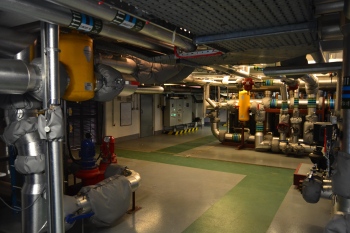The perils of air

Contamination in commercial heating systems can be a costly affair, leading to increased running costs and a higher probability of system breakdown. Kevan Peaker of Spirotech highlights some of the key symptoms to look out for in commercial heating systems, many of which are caused by the build up of dirt and air.
Inefficiency and malfunctioning can occur in a heating system if air and dirt (magnetite) are not correctly or sufficiently removed from the system’s water. Both contaminants are catalysts for trouble. If these issues are not diagnosed and dealt with, the likelihood of problems occurring increases — including system breakdowns.
In commercial systems, common problems are magnified when compared to those experienced in a domestic environment. What’s more, whilst modern heating systems are dramatically improved in terms of design and efficiency compared to their older counterparts, they are much more sensitive to dirt and air contamination, which will lead to them slowing and malfunctioning in a shorter time frame and with more destructive effect.
With so much emphasis placed on big-ticket items, like boilers or chillers, arguably the most crucial element — system water — is too often not given ample consideration. Water quality in a system still remains overlooked by many, yet by not properly caring for it, end users are setting themselves up for a host of long-term problems and unnecessary costs within a relatively short time frame.
Here, we will look into the range of issues that can occur as a direct result of poor system cleanliness, how to diagnose these issues and how best to minimise these problems.
One of the tell-tale signs of a contaminated system is an audible increase in noise levels when a heating system is in operation. Air pockets will naturally occur if air is not constantly removed through de-aeration, which will cause bangs and clanging in the radiators. The presence of air gives rise to increased system dirt, too, which can clog up certain sections of the radiators or the pump, which will generate unwelcome intrusive sounds. If these sounds become noticeable, action should be taken immediately to prevent problems persisting.
All components in today’s systems will likely have an A or B energy label from day one of installation. However, no matter how good the core system units are, you will notice that energy efficiency will rapidly decline if system water isn’t treated correctly and dirt and air appropriately removed. Correct water treatment involves appropriate chemicals treatments, system de-aeration and dirt separation.
The end-result of a dirty system is system imbalance — one sign of which is reduced pump performance, which may lead to increased breakdown periods, excessive wear and higher energy consumption. Ultimately, all these issues cost the end-user more money in the long run and inevitably result in a more expensive maintenance programme and the chance that system components will have to be replaced more frequently.
With regular checks essential to maintaining a healthy heating system, you may notice that key components are deteriorating much faster than expected, whilst not performing at their optimum level. If the boiler’s pump is contaminated with magnetite, it will work harder to try to achieve the same output, inevitably decreasing the product’s expected life span.
A poorly designed, installed or maintained pressurisation system can lead to negative pressures around the circuit. This will become clear when air is drawn in through automatic air vents, gaskets and micro leaks. High pressure can also lead to water being emitted through the safety valves and the subsequent frequent addition of further raw refill water. To avoid issues with poor pressurisation, a heating system must be correctly designed to ensure it is fit for purpose for the size and requirements of the building.

The final symptom of an imbalanced and dirty heating system is a breakdown of the system itself. Spirotech products, for example, have been proven to reduce system breakdowns by as much as 27%, dramatically reducing emergency repair costs and system downtime.
Best practice dictates that to avoid the inevitable strains on a heating network, system fluid must be appropriately treated (through air removal and dirt separation) to help prevent symptoms arising and hampering optimum performance. This will help save those charged with maintaining heating systems both time and money.
Kevan Peaker is UK national sales manager for Spirotech.







